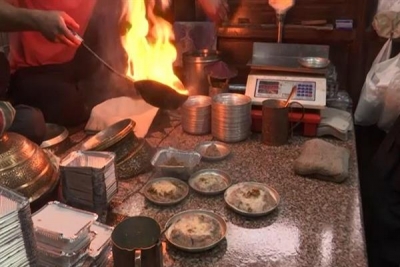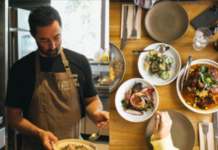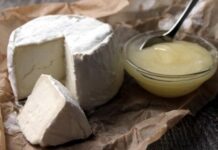SHEIKH QAYOOM
Srinagar– For 47-year old Zahoor Ahmad Bhat, running the family’s Harisa shop at Aali Kadal in old Srinagar city is not just another profession, it is a 200-year old tradition to which the family appears to be inextricably bound.
As the devotees leave the mosque outside, Zahoor’s Harisa shop suddenly starts bustling with activity.
The devotees enter the small eatery and sit lined up to have the Kashmiri meat delicacy that is believed to keep them warm during the harsh winter months.
Zahoor’s father, Ghulam Muhammad Bhat, no longer works full-time at the shop.
“Lala comes everyday to select the choice lamb/mutton we use to make Harisa. He says despite his failing health, he cannot afford to compromise on the quality of mutton that is used to make the Harisa,” Zahoor told IANS while recalling the days when his father was young.
“As a boy, my main attraction was to go to Lala’s shop where was to be given a little Harisa by my father. I would have a little of it almost daily during the winter months,” recalled Zahoor.
Ghulam Muhammad Bhat says the family is in this business for over 200 years. How is it that the Harisa of his shop is the best and the most sought after in the city?
“It is very simple. Two-hundred years of hard work to perfect the recipe and the experience and patience that followed those two centuries,” Ghulam Muhammad smiles proudly over the popularity of his shop.
Harisa is essentially a winter preparation. Usually, the specialty is available from mid-December to end of March, depending upon whether the winter is long or short.
Preparing Harisa is a very laborious process that starts in the evening hours. The process begins with chopping the mutton. A large earthen pot is then used to cook the lamb chops on a slow flame. An earthen matka is kept on flame till the bones start separating from the meat and becomes meshable.
Removing the bones from the meshed meat is the most skilful task in the making of Harisa. Even if a small bone remains in the meat, the whole thing gets spoiled.
In another earthen vessel, rice cooked on slow flame is added to the soft mutton.
A blend of spices — cloves, cardamom and fennel seeds — are mixed with the cooked mutton and rice. The mixture is then shifted into a large copper vessel where it is continuously stirred till it turns into a paste.
Harisa has high calorific value and is very nutritious. It is served steaming hot on plates. Those who know how to relish the preparation eat it with oven fresh local bread called ‘Kandar Kchout’.
If you think of going to Zahoor’s Harisa shop at 8 a.m. to buy or have a portion of his specialty, you will return disappointed.
Customers, who cannot compromise on taste and quality of the preparation, leave their nickle coated copper vessels at Zahoor’s shop in the evening to be collected with the specialty the next morning. The volume of the vessel depends on the quantity of Harisa one wants to buy.
It is usual for the regular customers to buy around 2 kg of Harisa from Zahoor’s shop that is enough for an average family of 5-6 members.
It is breakfast and lunch rolled into one. Heavy to digest, locals take a cup or two of the Kashmiri salt tea which helps digest the heavy food.
One kg of Harisa at the shop costs Rs 700. Zahoor’s customers are spread all over the Valley and outside.
“Almost from every district of the Valley to Delhi and Mumbai, our customers are spread all over the country depending upon their eating preferences. Among the non-vegetarian local foods and delicacies, Harisa stands out as the best and complete diet for a frosty, winter day,” Zahoor said.
As a traditional food preparation, Harisa along with the local cuisine called the ‘Wazwan’ has lived over centuries.
There is this story about an Afghan governor of Kashmir. He is believed to have liked the specialty so much that he ignored the advice of his lieutenants about when to stop. The governor is believed to have over-eaten himself to death.
If one has tasted Harisa once in his/her life, one would excuse the over indulgence of the ignorant Afghan governor. (IANS)













